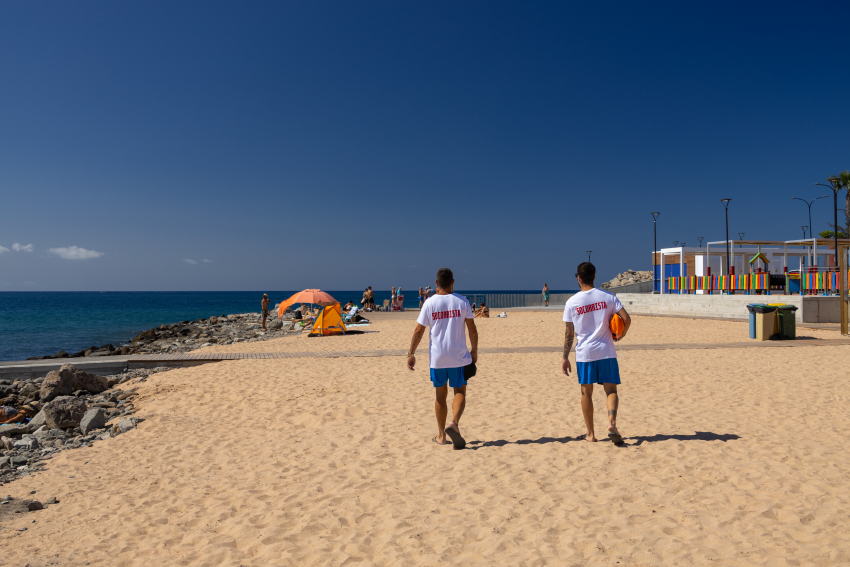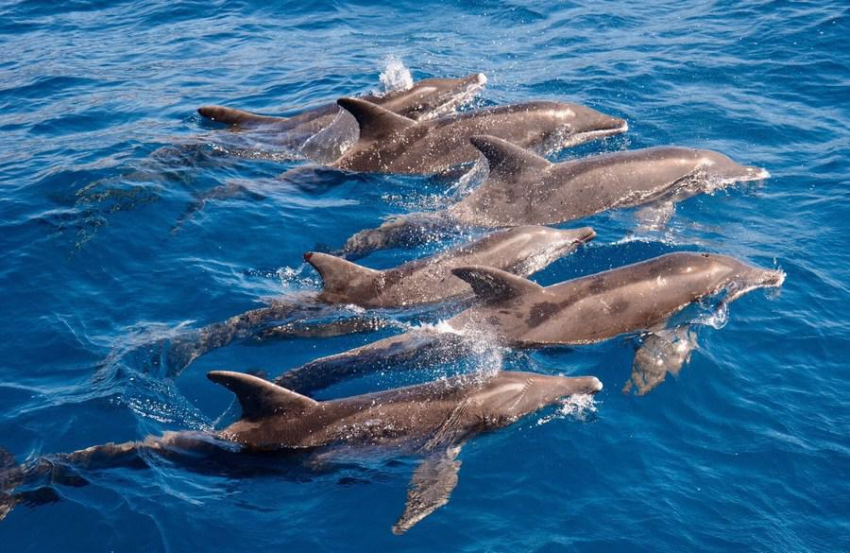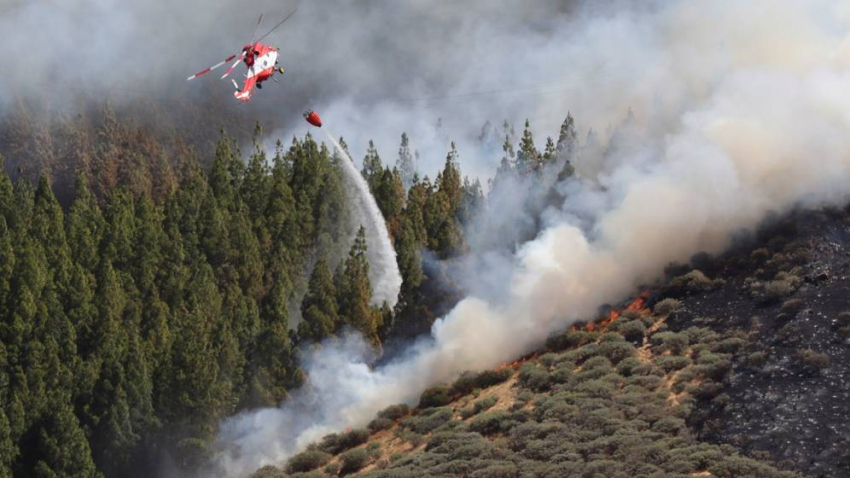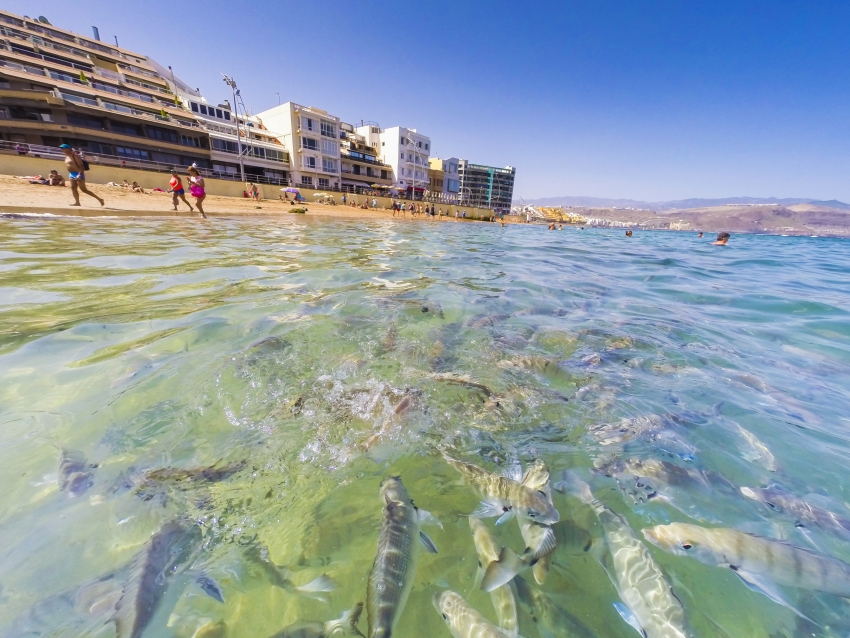Alex Bramwell
Living In Gran Canaria: Learning Spanish
While you can live in Gran Canaria for years and not speak a word of Spanish, we don’t recommend it; even a few words of the local lingo makes a massive difference to your quality of life and to how the locals treat you.
Learning Spanish in Gran Canaria is essential if you want to fit in with local life or work on the island.
If you don’t speak the language, Canarians will treat you like they treat all tourists; you’ll get superficial politeness but never be more than just another guiri amongst the herd.
The simple truth is that your Spanish develops to the level you need for everyday communication. If you work with foreigners, socialise with foreigners and watch television in English, you won’t pick up much of the local lingo. But if you do Spanish classes, spend time with Canarians, and hit the books every now and then, your Spanish will develop fast.
We know people who were fluent within six months of arriving on the island and others that have lived here for decades and haven’t got past “un Tropical por favor”.
Guess who gets extra mojo on their papas!
Three ways of learning Spanish in Gran Canaria (fast)
All the people we know that have picked up Spanish quickly have done one or all of these three things.
Go local
For the ultimate crash course in local Spanish, get a Canarian boyfriend or girlfriend who doesn’t speak English. That way you’ll have to learn the language quickly.
Or sign up for language exchanges. As well as being the easiest way to get a Canarian boyfriend or girlfriend, exchanges help you to meet people, both local and guiri, and to practise your Spanish.
Men will find it useful to hang around in a local bar. Pick a grotty one where men sit on bar stools all day long and shout at the television, and at each other. Don’t try and match them for drinks but do join in with the conversation. Your Spanish will come on in leaps and bounds. You may even become fluent just before you die of cirrhosis of the liver.
The bar route to fast Spanish is more complicated for women as local Canarian bars are almost always sausage parties. Organised language exchanges and ERASMUS events are better options.
Study smart
The next best way to learn Spanish is to enroll in an academy or the official language school and do a course, or at least regular Spanish classes. With lots of effort, there’s no reason why you won’t be fluent (más o menos) within a year.
Now, the main factor here is to find a way of studying Spanish that suits you. Intensive courses can be overwhelming for many people and occasional lessons don’t really give your Spanish that much of a boost.
The key is to sign up for regular Spanish classes and to pick an academy or school that has a good teacher: I can’t stress this enough; a good teacher is worth far more than any patented language learning method.
Practice makes perfecto
Obviously, not everyone can study full time so the third best way to learn Spanish in Gran Canaria is to take every opportunity to practise. Again, language exchanges and local activities are a great start. And tapes, online courses, and books are great reinforcement tools.
At the end of the day, effort and motivation are what counts.
Gran Canaria language schools
There are lots of language schools in Gran Canaria that offer Spanish courses to foreign residents. It’s worth asking around for recommendations because the quality of lessons varies.
A good Spanish teacher is worth more than any teaching system.
In Las Palmas, we recommend the World Language Centre right by Plaza Ferray in Guanarteme: It has an excellent Spanish teacher and is right opposite the cafes in the square for post-lesson practice.
The WLC offers regular classes and semi-intensive course and has small class sizes and a dynamic approach to teaching.
Learning Spanish in Gran Canaria as a beginner
If you’re really serious about learning Spanish in Gran Canaria (and have the mornings free), do a course at your local Escuela Oficial de Idiomas. These state-run centres are cheap but you need a Spanish-speaking friend to get you enrolled as the reception staff don’t speak English.
The Las Palmas official language school is on Fernando Guanarteme opposite the Plaza de Farray. There’s a second one in Siete Palmas. Here’s the full list of EOI centres around Gran Canaria (there’s one in most big towns and in Maspalomas). Note that they don’t all offer Spanish lessons as their main purpose is to teach foreign languages to the locals.
Escuelas Oficiales offer daily lessons and teaches Spanish in a classroom environment. It’s best to combine lessons with informal conversation classes or language exchanges. Class sizes are large and morning lessons are impossible if you work, but if you have the time the Escuela official is a good option.
Intensive Spanish courses in Gran Canaria
You’d be amazed how much Spanish you can pick up if you do an intensive course based on immersive learning.
The World Language Centre offers semi-intensive Spanish courses that stretch you but don’t overwhelm your brain.
The Inlingua Academy right by Triana Street in Las Palmas’ shopping district is a great place to do an intensive Spanish course. It’s one of the city’s oldest and most popular language academies and offers a range of courses to suit all requirements:
If you want an intensive Spanish course, Inlingua offers weekly courses for small groups and focuses on TEFL-style dynamic teaching. You learn the language by speaking the language.
If you can’t manage 20 hours per week, there’s also the option of a 4-hour per week course.
Inlingua also does individual classes and can arrange accommodation for you with a local host family.
There are plenty of other academies in Las Palmas and all over Gran Canaria that offer Spanish lessons and intensive courses. The key is to ask for recommendations and find a teacher that knows their stuff.
Private Spanish tuition in Gran Canaria
There are plenty of private Spanish teachers on the island and they charge between 15€ and 20€+. The quality varies so we’d recommend you ask for recommendations and try a couple until you find one you are happy with.
One excellent option for learning Spanish in Gran Canaria is La Casita de Laura. Here you get an immersive Spanish experience with accommodation, outdoor lessons and lots of Spanish conversation.
Laura takes students to practice in real life situations (and even sends you to a restaurant for your homework). She also organises hiking tours and lots of free events so her students can get to know some locals and discover Gran Canaria. Laura even teaches you how to cook paella and traditional Canarian recipes in Spanish cooking workshops.
Language exchanges in Gran Canaria
Language exchanges are one of the best things all newbies can do to meet people and learn Spanish in Gran Canaria. The idea is that you meet a group of locals and spend half the time learning Spanish and the other half helping them with their English.
Start with the Language Exchange Gran Canaria (LEG). It organises exchanges all over the island and its website has a great resource section.
Follow the LEG on Facebook.
Online support
Using online resources is a great way of reinforcing what you learn. Here are a few decent sites to try out.
BBC Notes in Spanish
On learnspanish.com they have a very useful audio guide to the top 100 Spanish phrases, it is well worth downloading and listening to as it will actually make you sound more Spanish and less foreign.
Subscribing to Spanish podcasts is a great way to learn the language. The following are a good start.
BBC Mundo
Notes in Spanish
Cadena Ser
Our recommendations about learning Spanish in Gran Canaria
1. Get a private tutor or go to an academy: This will improve your understanding of the language as well as your speaking and listening.
2. Use listening resource in the car or on the phone. Something like the Michael Thomas iTunes downloads – these will boost confidence and give you a real kick start in the language. Although they will not give the grammatical base that you will later need, they will give you the confidence to go out there and try to use the language.
3. Work your way through a textbook. Starting Spanish from scratch is a slow process if you only work with your tutor. If you work hard by yourself on vocabulary and grammar you will improve a lot quicker.
Then...
1. Read a Spanish book that you’ve already read in English– get a trashy novel and read it – don’t look up the vocabulary unless absolutely necessary and enjoy reading in Spanish. Choose your book wisely; something you’ve already read in English. The Harry Potter books, CS Lewis and Isabel Allende’s children’s books are a good start. Or browse the local papers over a coffee (but don’t try to understand the local politics; nobody does).
2. Try to watch TV – choose an American programme dubbed into Spanish, they use less vocabulary and are easy to understand. To begin with use subtitles in Spanish too.
3. Continue with your tutor or academy lessons.
4. Listen to a couple of podcasts and try to learn some Spanish phrases. The real Spanish vocabulary guide is a very good start
Buena suerte!
Living In Gran Canaria: Guide To Driving Well
Driving in Gran Canaria isn't so bad but there are a few things you need to know to avoid scares and fines.
Let’s start with avoiding fines as you can be fined for almost anything here, and knowing what fines exist will make your stay a lot cheaper.
Parking – don’t park on a yellow line. They will catch you and they will fine you.
Single white lines – If there is a single white line in the middle of the road you can’t cross it.
Carry all your documents ALL the time. The police can stop you anywhere and ask to see your paperwork.
You need...
Your permiso de conducir (driving license). This can be downloaded onto your phone on the Tráfico app.
Your permiso de circulación (Car certificate)
Your insurance AND the last bank statement showing you have paid it. If you don’t have the statement you can be fined. However, the police can now access this information from their cars so some insurance companies don’t issue papers any more.
Your ID (DNI or passport) – They can fine you for not having it.
Your last road tax payment.
You need to carry at least 2 flourescent bibs. One for the driver and one for each passenger. (buy them in the Euro shop or in a garage)
You have to have a triangle in case you have an accident.
Now the driving – Spanish drivers are fine. They are not the aggressive, erratic Seat Marbella driving lunatics you see on TV. However there are a few subtle differences in their driving that are worth knowing before you venture out on a Canarian road.
They use horn a lot, and will shout and gesticulate at you for no particular reason. Unless you have cut them up smashed into their new Seat or driven them off the road, ignore them – some people just like to overreact.
Gran Canaria drivers have no idea how to use a roundabout because in the Canarian driving test they are taught that any car in the outside lane has priority. Therefore, if you are going round the inside of a roundabout and someone overtakes you on the outside and you crash into them when you are leaving the roundabout, you will have a hard time convincing them it is their fault. You can try and use the inside lane if you want to be pedantic but its safer to always use the outside lane
Reverse parking – get good at it. Unless you want to pay extortionate Canarian parking fees you are going to need to know how to fit your wheels into a space designed for a bicycle.
But don’t be afraid driving in the Canary Islands. In general, it is no different from anywhere else and far easier than London. If you want to go up to the mountains though make sure you have a good head for heights, some of the roads in the south and on the north coast have over 1000 metre sheer drop on one side! The views are pretty spectacular though and it’s well worth soiling your pants for a bit to see them.
It is polite to pull over if you are driving the car that is holding up a load of locals on mountain roads.
Renting a car in Gran Canaria
If you choose to explore Gran Canaria by car, take all the hassle out of renting by using Mr Car Hire Gran Canaria...
Mr Car Hire, an independent rental broker, offers a complete Gran Canaria hire car service with car-to-door delivery anywhere on the island, fully comprehensive insurance and 24/7/365 support.
Best of all, he does it at great prices and offers top service, no queues, dirty cars or long waiting times.
Rent your car via Mr Car Hire and you'll get:
- A wide choice of cars at reasonable prices with absolutely no hidden extras
- Delivery to anywhere in Gran Canaria and car collection anywhere on the island
- Comprehensive insurance and 24/7/365 support and breakdown cover
- Personal service and a completely stress-free car rental experience
Contact him right here and Mr Car Hire be right back in touch.
Living In Gran Canaria: Getting A Teaching Job
Teaching English has always been one of the main ways foreign residents have lived and paid their way in Gran Canaria. While things are getting hard for unqualified teachers, there are always jobs around.
Living In Gran Canaria: Buying A Car
Buying a second hand car in Gran Canaria is a fairly simple process provided you know some Spanish and a bit about cars. If not, get some help.
Living In Gran Canaria: Total Shopping Guide
With one of Spain’s top outdoor shopping areas and several well-stocked malls, Gran Canaria (and especially Las Palmas), has become a great place to shop. The new shopping centres due to open in Puerto Rico will make a big difference in south Gran Canaria.
Living In Gran Canaria: Getting A Driving Licence
Renewing a Spanish driving licence in Gran Canaria is now a simple procedure. All you need is to pass a few simple medical tests.
Living In Gran Canaria: Opening A Business
If you’re planning to open a Gran Canaria business, the first thing you need to do (after a market study and lots of research) is to work out what type of company or self-employed status is best.
Living In Gran Canaria: Finding A Job
Everyone wants to move to Gran Canaria, find a good job and live the sunny life. It can be done, but we’re not going to kid you that it’s easy. Gran Canaria is a small island with lots of local unemployment.
This means that there aren’t lots of large companies with middle-management structures and there is fierce competition for the jobs that do come up.
Your chances of getting a job in the local economy are pretty much zero unless you speak excellent Spanish. And you can’t just walk into a job in a hotel either. Most won’t take a candidate unless they speak at least three languages and have a tourism qualification or degree.
That said, determined people find work here every year, and there are several niches where foreign residents can always find work.
So you want a job, read our guides below to see what jobs are available and how to get them.
UPDATE 2022: Remote work, nomads and coworking
Job prospects for foreigners in Gran Canaria, and especially in Las Palmas, have improved no end in the last few years thanks to the growing remote worker and digital nomad scene. Focused around coworking sites dotted all across the city and beyond, the scene has now grown enough to create its own employment ecosystem. The hope is that ZEC company investment will flow in and make even more of a Gran Canaria a leading remote work and offshoring location.
That said, the work available is almost all digital; in the programming, online project management, etc. The nerds have arrived, and are taking over!
Spain's tax rules are a little behind when it comes to people residing in Spain but earning their living abroad so talk to a gestoria about how to get your taxes right.
Jobs in North Gran Canaria (Las Palmas, Telde etc)
Once you arrive in Gran Canaria you will find that most English speaking people in Las Palmas are teachers, so logically most of the jobs for English people are in schools. If you don’t want to be a teacher, you’ll probably have to head south to find a job as there aren’t many non-school jobs in the city. That said, the island has now probably reached peak English and teaching wages for TEFL teachers have dropped in recent years.
Teaching There are four types of teaching jobs each one requiring different qualifications and offering different pay.
English schools – These schools, most of the time, require a PGCE. However, it is not unheard of for unqualified people to get jobs. Send in your CV and see what happens. If you’re lucky they will need a teacher straight away. Monthly salary 1200€-1400€ depending on the school and job.
Bilingual schools – These schools don’t usually require PGCE qualified teachers but a TEFL qualification helps. They pay less and working conditions aren’t as good, but you get the long holidays. Salary approximately €1200.
Language schools – Language schools pay less and the working hours can be quite unsociable however they pay well enough to live a nice life here and can be flexible with working hours if you’re lucky. Salary/hour 9-15€.
Private English lessons – Plenty of teachers make a decent living by giving private English lessons. Either to children, adults or local companies. They key to getting them is to network and hustle like crazy. Pay can be anything from 10-50 euros per hour. Most private teaching work dries up in the summer.
Read our detailed guide to Gran Canaria’s schools and education system for more info.
Saturday Schools All the English Schools and the American school offer Saturday schools for children and adults. They pay very well €60-€80 9am -1pm. If you are interested contact the schools well before the course starts in October as Saturday jobs go fast. TEFL is preferred but it is not uncommon for non-EFL teachers to get work.
Translation If you speak two languages fluently it is worth sending out your CV to the translation companies. However, regular translation work isn’t easy to find and you need a qualification to translate official and legal texts (known as traducción jurado).
Summer schools: Lots of Las Palmas’ academies and surf schools run summer schools so it’s always worth asking around if you want work in July.
Random work in Las Palmas: Non-Spanish speaking work is hard to come by but labouring work can sometimes be found within the English community. It’s not easy to come by, but leave a message on the jobs page and something may come up. Other jobs that English people have had in Las Palmas include STEP / Aerobics instructor and bar work.
There are, of course, lots of foreigners living and working in Las Palmas who aren’t teachers. It’s just that most came to the island with their jobs. In the last few years the digital nomads have discovered the city and now hang out at cafes with their laptops (pretending to work). If you have a tech or design skill and want freelance work, drop in at coworking spaces like The House and Soppa de Azul and ask around. The same applies if you have a killer idea for an app.
How to get work in the north
Assuming you want to teach, the only real way to get work is to get yourself known. Send your CV to all the schools / language schools you’re interested in and then phone them (v.important) to make sure they’ve received your CV. It also helps to ‘just drop in’ to the schools you most want to work at.
If you want to teach private classes put posters up around your area and advertise yourself in the English bookshops Idiomatika and Canary Books and on the Internet at Tusclasesparticulares. Get business English lessons by dropping into to local businesses that sell to foreign clients and asking if they know anyone who might be interested.
Seriously, networking in person works in Gran Canaria while emails are rarely answered.
Jobs in south Gran Canaria
There are plenty of jobs in the South but you have to look for them; as Gran Canaria is such a great place to live there are plenty of other people looking too. Thousands of foreign residents arrive every year without work.
Websites / Press Jobs are not often advertised but before you begin your long trek around the thousands of bars in the south it is worth scouring the internet and resident newspapers and magazines.
PR If you think you’re a good salesman with experience of any kind and you speak English, Dutch, German or any Scandinavian language your best bet is find a job as a PR. These tend to be on the street directly selling to passers-by. You could be selling restaurants, bars, tours or timeshare. If you're good you can earn good money, if you’re not you’ll soon be looking for another job! Salaries can be commission only or with a basic set wage. To find a job, the best thing you can do is go and ask. Try bars and restaurants and for timeshare jobs find a current PR on the street and ask for the personnel office. It might sound unbelievable but timeshare sellers still make good money in south Gran Canaria. The gift of the gab is essential.
Bar work and restaurant work There are jobs for bar staff, waiters, cooks, entertainment, bouncers, and PR – they are rarely advertised and again just go around and ask. Don’t expect to make your millions this way, the minimum wage in Spain is 6.25€ and you’ll be lucky to get more than that. On average workers in the South will earn about 1050€ a month which is plenty to survive on and have a reasonably nice time.
Estate agencies Property buyers still prefer to deal with agents who speak their language and understand their needs. So, there is always work in south Gran Canaria’s estate agencies for go-getting people with sales or real estate experience. Quality south Gran Canaria estate agency Cárdenas Real Estate have been looking for English- and Norwegian-speaking staff.
How to get work in the south
There is work in the south of the island but there are more people looking for jobs than there are jobs, so to find work you have to stand out above the rest. Prepare a GOOD cv. Make sure it sells your skills well and is word-perfect. If you want to work in a bar make sure you have all your bar work on it.
Then give your CV to as many places as possible by hand. Speak to the owner and try to sell yourself, it will be much easier for them to call you if they know who you are, so make sure there’s a photo on your CV. If you haven’t heard anything for a couple of weeks visit all the bars again and let them know you’re still looking for work. Also, get to know people in the foreign community as many jobs are by word of mouth and personal recommendation so if you are known you will have more chance of finding work.
Finding a job may take a long time, so prepare yourself financially and don’t blow all your savings thinking you’ll get work quickly. If you have patience you will get work eventually but prepare to print out hundreds of CVs and many kilometres from place to place. While you’re waiting, try to learn Spanish it will really help your job opportunities.
Paying your taxes in Gran Canaria
Most jobs you get will offer you a contract and they will pay your taxes for you (about 20%). However, if you are self-employed or are receiving cash in hand, legally you have to pay autonomous contributions. These are about 270€ a month (less for the first couple of years) and cover your social security. You have to declare your earnings and pay taxes every three months or once a year, depending on the job.
Lots of south Gran Canaria businesses just pay cash. While it is unlikely that the taxman will catch you, be aware that it is illegal.
Getting a work permit in Gran Canaria
It’s become much harder to just arrive in Gran Canaria, get residencia and start working unless you are an EU citizen. In fact, it’s almost impossible. Spain now only hands out residencia and an NIE number to people who have a job, buy a property or have lots of money in the bank. In theory, you can only stay in Gran Canaria for three months unless you get residencia.
This means that if you come without work you need to find a job before you can become a resident and get an NIE (which you need to rent a property, open a bank account, etc). It’s a bit of a chicken and egg situation but if you have a work contract, you can get it done.
Gran Canaria Dolphin Watching Trips
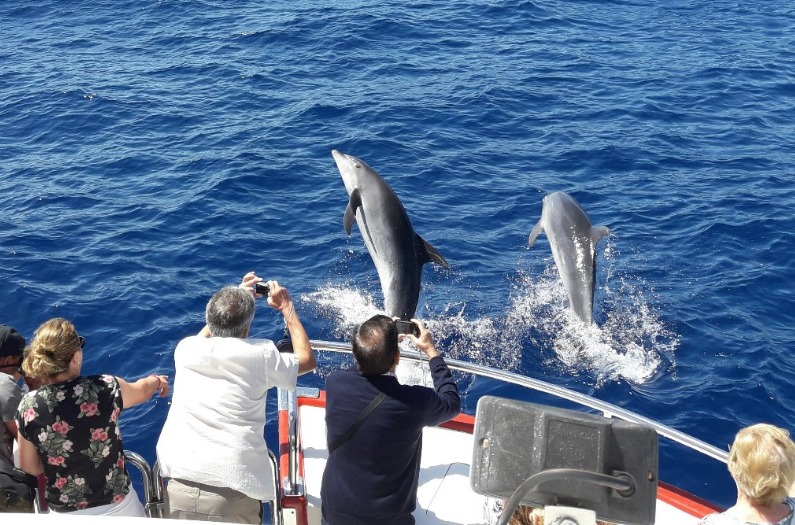 Gran Canaria is an exceptional place to go on a dolphin and whale watching boat as 27 of the world's 80 species of cetaceans have been recorded around the Canary Islands.
Gran Canaria is an exceptional place to go on a dolphin and whale watching boat as 27 of the world's 80 species of cetaceans have been recorded around the Canary Islands.
Common species include resident bottlenose dolphins (like Flipper) and short-finned pilot whales. Other species that visit Gran Canaria ever year are Risso's dolphins, common dolphins, spotted dolphins, spinner dophins, minke whales and the mysterious beaked whales.
The resident bottlenose dolphins are almost always just iff the south coast and easy to find while other species come and go with the seasons and the tuna. What makes Gran Canaria such a great whale- and dolphin-spotting location is that you never know what you are going to see but you do know that there will be something out there.
Alex Says: All dolphin and whale watching boats in Gran Canaria have to follow a strict Blue Boat code of conduct that guarantees the peace and safety of the animals.
Dolphin watching trips in Gran Canaria
All the trips we work with offer transfers to and from your accommodation in all the main Gran canaria resorts.
You are almost guaranteed to see dolphins on any given day but also watch out for whales, sea turtles and seabirds, and even flying fish.
Choosing the right Gran Canaria dolphin-watchin boat
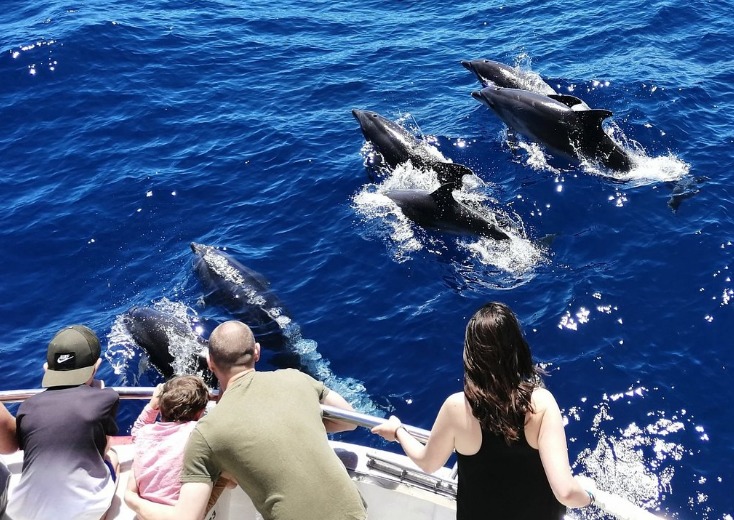 The budget option is the two-hour trip on the Supercat catamaran. If the dolphins are there, the Supercat will find them. However, many people prefer a smaller boat because the experience is more intimate (you are closer to the water and it is much quieter). We recommend the Exclusive Dolphin Search Charter and the Blue M Yacht Luxury Dolphin Charter. Bother offer a four hour experience that includes the dolphins and also time for a swimming and relaxing stop by the coast.
The budget option is the two-hour trip on the Supercat catamaran. If the dolphins are there, the Supercat will find them. However, many people prefer a smaller boat because the experience is more intimate (you are closer to the water and it is much quieter). We recommend the Exclusive Dolphin Search Charter and the Blue M Yacht Luxury Dolphin Charter. Bother offer a four hour experience that includes the dolphins and also time for a swimming and relaxing stop by the coast.
To see more info about any of these options, and to chat to our local booking expert, just use this Whatsapp Form. Our Gran Canaria team has tested all the excursions and will be able to suggest the right trip for you.
Book your dolphin watching trip here
Dolphin watching trips are a popular Gran Canaria excursion and places are limited by the size of the boat. Book your trip with Gran Canaria Info in advance and you'll have your spots reserved any day you want.
Gran Canaria Fire Now Extinguished
Tejeda has been evacuated after strong winds reactivated the Gran Canaria fire and pushed flames towards the town. The fire is currently out of control and spreading on several fronts.
Gran Canaria Info recommends:
- Default
- Title
- Date
- Random

